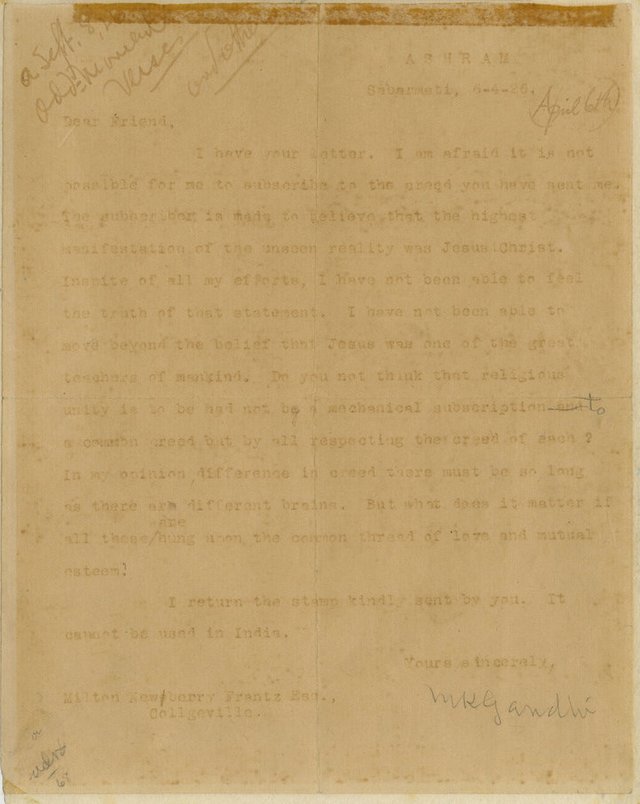Letter Revealing How Gandhi Really Felt About Christianity is Sold For $50,000
A private purchaser in the U.S. has acquired a chronicled letter in which Indian autonomy pioneer Mohandas K. Gandhi muses about his own association with Jesus and Christianity.
The composed report, which contains Gandhi's transcribed signature, sold to a purchaser in the Northeast for $50,000 on Friday, as indicated by Nathan Raab, leader of the authentic archive merchant Raab Collection in Ardmore, Pa. The organization revealed to HuffPost it doesn't unveil the personality of its purchasers or merchants.
In 1926, an American Christian religious senior, Milton Newberry Frantz, kept in touch with Gandhi, welcoming the Hindu pioneer to peruse an article Frantz had expounded on Christianity. On April 6 of that year, Gandhi composed back to Frantz from an ashram in Gujarat.
Gandhi composed that he felt Jesus was "one of the immense instructors of humankind." However, he couldn't buy in to the Christian conviction that Jesus was more than that.
Dear Friend, I have your letter. I am apprehensive it isn't workable for me to buy in to the statement of faith you have sent me. The endorser is made to trust that the most astounding appearance of the inconspicuous the truth was Jesus Christ. Notwithstanding every one of my endeavors, I have not possessed the capacity to feel reality of that announcement. I have not possessed the capacity to move past the conviction that Jesus was one of the immense instructors of humanity.
Gandhi goes ahead to express that it's critical to regard all individuals' confidence conventions, since all religions depend on a "consistent theme of affection and common regard."
Do you not feel that religious solidarity is to be had not by a mechanical membership to a typical statement of faith however by all regarding the ideology of each? As I would see it, contrast in statement of faith there must be insofar as there are diverse brains. Be that as it may, who does it make a difference if all these are hung upon the ongoing idea of affection and common regard?
Gandhi experienced childhood in a Hindu family that was fundamentally given to the love of the god Vishnu. He was likewise acquainted at a youthful age with Jainism, a religion that accentuates peacefulness.
For a lot of his grown-up life, Gandhi truly contemplated the religions of the world. He read the Quran, Jesus' Sermon on the Mount and the compositions of Leo Tolstoy on Christianity. He was profoundly affected by the Bhagavad Gita, one of the center religious messages in Hinduism, and remained a conferred Hindu for whatever is left of his life.
When he composed the letter to Frantz, Gandhi had just developed as a main figure in India's development for freedom from British run the show. He had enlivened a great many devotees to blacklist British foundations and urged numerous to supplant imported British merchandise with things created in India.
In the wake of being captured and imprisoned for subversion in 1922, Gandhi withdrew from political unmistakable quality for a couple of years. The letter to Frantz was composed amid this time.
Gandhi reemerged as a political pioneer by late 1928 and in 1930 propelled the Salt March, a huge peaceful dissent against the British salt expense.
At the point when India accomplished autonomy in 1947, Gandhi unequivocally contradicted the nation's parcel into India and Pakistan, and he asked Hindus and Muslims to live respectively gently. He was slaughtered on Jan. 30, 1948, by a Hindu fan who was furious about Gandhi's endeavors to consult with Muslims.
.jpg)

.jpg)

.jpg)
Nice post. I like the last line in his letter to Frantz: "I return the stamp kindly sent by you. It cannot be used in India." Gandhi was a frugal guy.